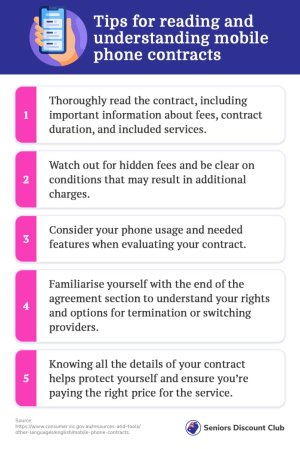Are phone companies ripping you off? How to avoid mid-contract price hikes
- Replies 15
One important aspect of managing your finances in Australia is understanding your rights as a consumer when it comes to mobile phone contracts, including what phone companies are allowed to do when it comes to changing prices.
Stuart Marsh, a writer and journalist for 9Finance on Nine.com.au, has a segment where he simplifies and clarifies consumer rights in Australia. Recently, he was asked to address the issue of mobile phone contracts and what telecommunications companies are permitted to do in terms of pricing.
A concerned reader asked Stuart if phone providers have the right to increase their plan prices during a contract period, as they experienced an unexpected $5 increase in their Vodafone plan despite having already signed a contract.

The reader wrote: 'Hi Stu, I recently received an email from my phone provider Vodafone that informed me the price of my plan was going up by $5. I thought I signed a contract on this. Surely they can't increase the price without making me sign a new contract, can they?'
And here's what Stuart wrote in response: 'Hi there - I'm afraid it very much depends on your contract. There may be a clause there that says prices may change if customers are given due notice, hence the email.'
He added: 'Fundamentally, customers must abide by the contracts they sign with major companies, although that doesn't mean companies can offer contracts with unfair terms.'

However, Stuary also mentioned that there are some rules in place that phone companies must follow. The Australian Communications and Media Authority (ACMA) stipulates that telcos must provide sufficient notice prior to making any contract changes, and these changes must not negatively impact the customer.
Do be careful if you decide to end your contract early, as there may be a fixed fee to pay – which is also legal and comes down to your contract's terms.
If you believe the contract you have is fundamentally unfair, you can take action. Start by lodging a complaint directly with your provider. If this doesn't resolve the issue, you can escalate it to the telecommunications ombudsman as a last resort.
Contract terms in Australia can't be unfairly disadvantageous, but the principle of 'buyer beware' still exists. That's why it's crucial to read the fine print carefully before entering any contract, including phone plans.

Some tips for reading and understanding mobile phone contracts
Digging into the terms and conditions of a mobile phone contract can feel like a chore, but it's important that you take the time to understand the details of your contract. Knowing exactly what's involved in your contract can help you avoid unexpected fees and mix-ups, and make sure you get the most out of your purchase.
To make sure you're getting the best deal for your needs and budget, here are just a few tips for reading and understanding your mobile phone contract.

Start by reading the contract thoroughly, and looking for any important information about your plan, such as the fees you can expect to pay, the duration of the contract and the services that are included.
Be on the lookout for hidden fees, such as those for early termination or late payment, and make sure you're clear on any conditions that could result in additional charges.
You should also consider the services and features that are part of your package, and how they match your needs. Think about your typical phone usage, as well as any features you need or would like to have. This includes data allowances, calling and texting limits, and access to customer support.
Finally, make sure you read through the end of the agreement section and familiarise yourself with the details of how you can end your contract or switch to a different provider.
Understanding your rights and responsibilities as a consumer when it comes to mobile phone contracts in Australia is crucial.
While phone companies are bound by rules and regulations, such as providing notice and avoiding negative impacts on customers, it's important to be vigilant and read contract terms carefully.
If you encounter issues or believe a contract is unfair, taking action by lodging complaints with the provider or escalating the complaint to the telecommunications ombudsman are options to consider.
So, before signing any contract, including phone plans, remember to review the fine print and be aware of your rights. Have you ever faced unexpected changes in your phone contract? How did you handle it? Share your experiences and thoughts in the comments below.
Stuart Marsh, a writer and journalist for 9Finance on Nine.com.au, has a segment where he simplifies and clarifies consumer rights in Australia. Recently, he was asked to address the issue of mobile phone contracts and what telecommunications companies are permitted to do in terms of pricing.
A concerned reader asked Stuart if phone providers have the right to increase their plan prices during a contract period, as they experienced an unexpected $5 increase in their Vodafone plan despite having already signed a contract.

Mobile phone contracts in Australia may contain clauses that allow price increases if customers are given due notice. Credit: Unsplash/Luis Villasmil.
The reader wrote: 'Hi Stu, I recently received an email from my phone provider Vodafone that informed me the price of my plan was going up by $5. I thought I signed a contract on this. Surely they can't increase the price without making me sign a new contract, can they?'
And here's what Stuart wrote in response: 'Hi there - I'm afraid it very much depends on your contract. There may be a clause there that says prices may change if customers are given due notice, hence the email.'
He added: 'Fundamentally, customers must abide by the contracts they sign with major companies, although that doesn't mean companies can offer contracts with unfair terms.'

Australian Communications and Media Authority (ACMA) states that telcos must inform customers before making changes to contracts. Credit: Unsplash/Gabrielle Henderson.
However, Stuary also mentioned that there are some rules in place that phone companies must follow. The Australian Communications and Media Authority (ACMA) stipulates that telcos must provide sufficient notice prior to making any contract changes, and these changes must not negatively impact the customer.
Do be careful if you decide to end your contract early, as there may be a fixed fee to pay – which is also legal and comes down to your contract's terms.
If you believe the contract you have is fundamentally unfair, you can take action. Start by lodging a complaint directly with your provider. If this doesn't resolve the issue, you can escalate it to the telecommunications ombudsman as a last resort.
Contract terms in Australia can't be unfairly disadvantageous, but the principle of 'buyer beware' still exists. That's why it's crucial to read the fine print carefully before entering any contract, including phone plans.
Key Takeaways
- Phone companies in Australia are required by the ACMA to provide sufficient notice and not negatively impact customers when making changes to contracts.
- Early termination fees may be applicable as per the contract terms.
- It's important to carefully read and understand contract terms, lodge complaints with the provider if needed, and escalate to the telecommunications ombudsman if necessary, as contract terms cannot be unfairly disadvantageous, but the principle of 'buyer beware' still applies.
Some tips for reading and understanding mobile phone contracts
Digging into the terms and conditions of a mobile phone contract can feel like a chore, but it's important that you take the time to understand the details of your contract. Knowing exactly what's involved in your contract can help you avoid unexpected fees and mix-ups, and make sure you get the most out of your purchase.
To make sure you're getting the best deal for your needs and budget, here are just a few tips for reading and understanding your mobile phone contract.

It is essential for customers to carefully read and understand their contracts before signing them. Credit: Unsplash/DocuSign.
Start by reading the contract thoroughly, and looking for any important information about your plan, such as the fees you can expect to pay, the duration of the contract and the services that are included.
Be on the lookout for hidden fees, such as those for early termination or late payment, and make sure you're clear on any conditions that could result in additional charges.
You should also consider the services and features that are part of your package, and how they match your needs. Think about your typical phone usage, as well as any features you need or would like to have. This includes data allowances, calling and texting limits, and access to customer support.
Finally, make sure you read through the end of the agreement section and familiarise yourself with the details of how you can end your contract or switch to a different provider.
Understanding your rights and responsibilities as a consumer when it comes to mobile phone contracts in Australia is crucial.
While phone companies are bound by rules and regulations, such as providing notice and avoiding negative impacts on customers, it's important to be vigilant and read contract terms carefully.
If you encounter issues or believe a contract is unfair, taking action by lodging complaints with the provider or escalating the complaint to the telecommunications ombudsman are options to consider.
So, before signing any contract, including phone plans, remember to review the fine print and be aware of your rights. Have you ever faced unexpected changes in your phone contract? How did you handle it? Share your experiences and thoughts in the comments below.








